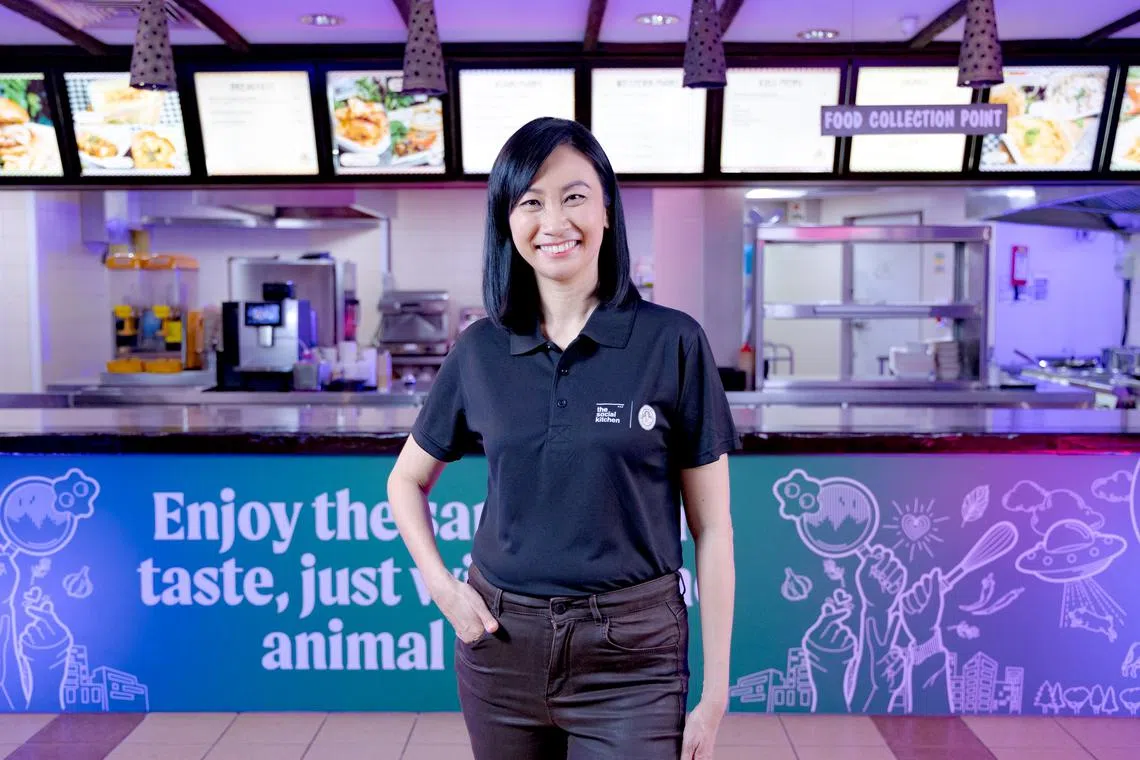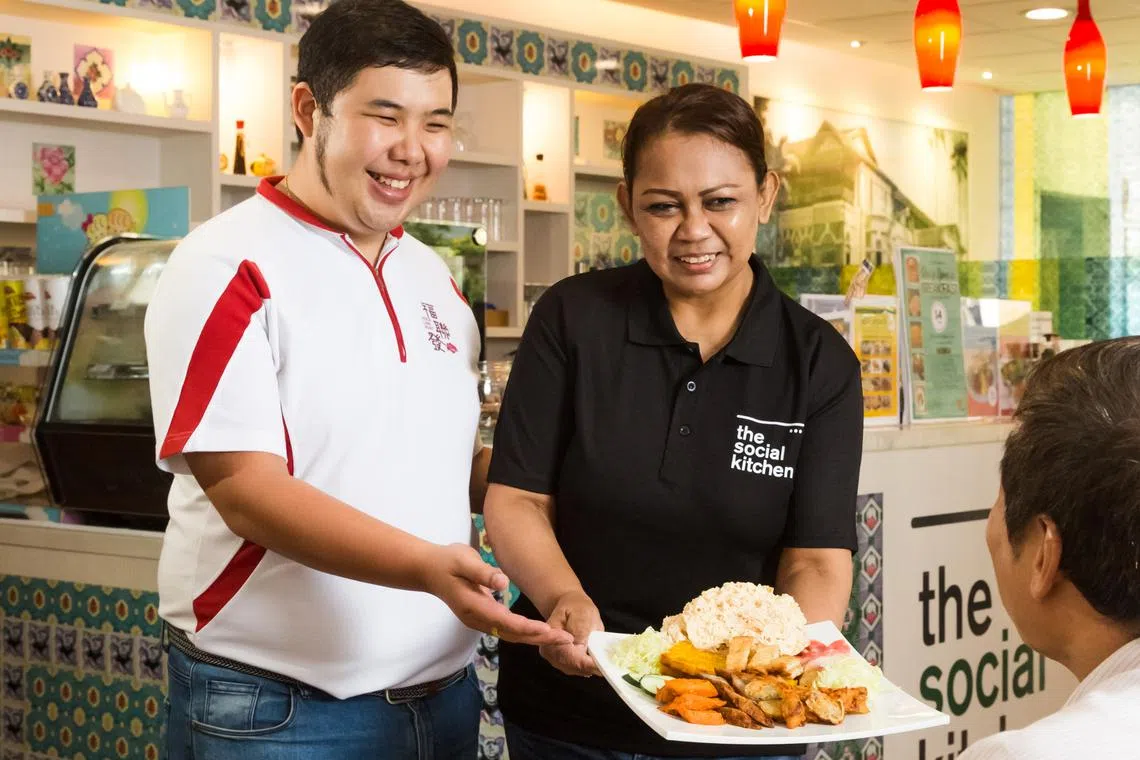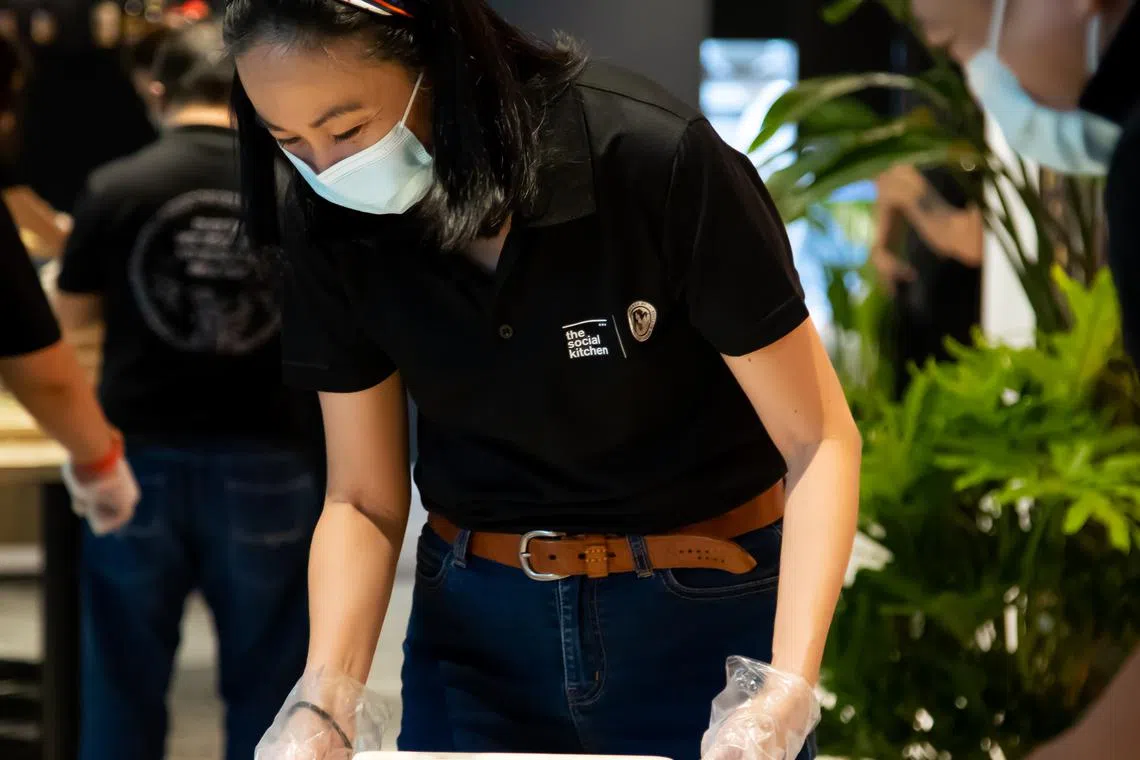Empowering the vulnerable through meaningful employment
In three years, The Social Kitchen fine-tuned a scalable business model that it hopes to take regional
THE Social Kitchen (TSK) is just three years old, but has boldly set its sights on one day being the largest employer of marginalised individuals, first in Singapore, then across South-east Asia, and even Greater China.
Given the rapid expansion and dynamism that have marked its first three years, those ambitions seem well-grounded.
TSK’s bold typeface logo now adorns 12 dining outlets and cafes across the island – from malls and office lobbies in the central business district to Gardens By The Bay.
The company trains and hires from across Singapore’s vulnerable community – persons with disabilities, single mothers, ex-convicts, mature workers, caregivers and more. About 50, including individuals with bipolar disorder, autism and Down syndrome, currently work at TSK’s outlets.
Meanwhile, under its “1000 for 100” initiative, individuals and corporations can purchase bento boxes for donation to the needy, packed by those employed by TSK. This raised S$80,000 from May 2022 to June 2023 alone, providing about 8,000 meals to those in need.
Amplification of social good is what the group aims for when it helps companies organise such corporate social responsibility (CSR) events, said TSK director Avelyn Lee.
Navigate Asia in
a new global order
Get the insights delivered to your inbox.
“Our selling point is that when they work with us, they are spending the same amount of money that they would elsewhere, but their impact is amplified three times. We earn a small margin and create jobs for the vulnerable. Meals are still delivered to needy families. And we advocate plant-based foods too.”

Since its launch in 2020 at the height of the pandemic, TSK has worked with more than 50 companies, including Unilever and Traveloka.
For its work in the community and for empowering marginalised individuals via training and employment opportunities, TSK emerged the winner in the small and medium-sized enterprises category at the inaugural Sustainability Impact Awards 2023.
SEE ALSO
It was also named one of the Steward Leadership 25 and Champions of Good last year. But it is not about to rest on its laurels.
Potential for exponential growth
“We can grow very big, it could be exponential,” said TSK founder Ang Kian Peng. “We are not like many social enterprises, for whom there is an asset investment with each new outlet. For us, we are very asset-light.”
Partner landlords – whether banks, property developers or non-profits – which provide space for TSK’s cafes are keen for their environmental, social and governance (ESG) efforts to succeed, while the food and beverage (F&B) partners focus on serving quality food without worrying about front-of-house service and manpower matters.
And TSK is able to ensure that the vulnerable staff they employ are trained and well-cared for. “What we focus on is the skill sets, we control the know-how. And this model works because everybody has a stake, everybody has skin in the game,” said Ang.

He also sees TSK as a “placemaker” that helps to make the right connections needed to spark community. “Take a building; it can be very cold and hard. To us, TSK’s cafes bring soul to concrete.”
It is a model that has been fine-tuned over the past three years, said Lee. “Over this time, we have been able to screen for partners who really, sincerely want to do good. And we’ve also converted and helped some – SME owners, for example – who want to do good, but may not know how to start.”
TSK is now in tentative talks to export this model to Indonesia, the Philippines and China. “We will have to find a partner, and we will not handle the day-to-day operations because that is better done by someone local. But we will be an adviser and consultant, to make sure that the model works,” she said.
As ESG concerns rise in priority for corporates, with policy shifts such as upcoming mandatory sustainability reporting for instance, Ang expects TSK to play a role in bridging corporates and charities.
“We always want to stay ahead of the curve. We can grow into an ESG company, where we help companies meet their ESG goals meaningfully.”

This is particularly so on the “social” front, said Lee. “This is where there is least attention and minimum capital spent. Many are buying solar panels, doing plant-based technologies, because those seem scalable. It often seems harder to attain scale when it comes to social impact,”
But founder Ang has had experience with projects driving multiple social goals. He is the man behind Samsui Kitchen, a social enterprise which trains inmates and persons with disabilities to prepare healthy meals for places such as nursing homes and student care centres.

This same drive to multiply social benefit extends to TSK’s selection of its F&B partners. For instance, it partners the homegrown AWE by OsomeFood, which focuses on plant-based and clean-label food, and Shanghai’s Bear Paw Cafe, whose coffee bens are from a farm managed by vulnerable persons.
Financial and manpower challenges
Even with its rapid growth, Lee said that the social enterprise’s trickiest challenge is still financial in nature.
While TSK did receive seed funding from the Singapore Centre for Social Enterprise (raiSE), it is not a charity, and hence has to ensure that finances remain sustainable.
Revenue is accrued mostly from the cafe outlets and bento delivery sales. TSK is able to take a cut from F&B partners’ sales because it negotiates preferential rental rates from landlords such as UOB.
Lee, who joined TSK in 2021 with over 25 years of experience in private banking and wealth management, stresses the importance of having “very, very clear books”. Those books now show that TSK has been able to build up some reserves. But she remains aware that these can be run down swiftly, especially as TSK’s expansion necessitates the hiring of more employees.
The social enterprise is currently looking to hire someone to run the meals donation and CSR arm of its business, as well as a welfare manager.
“At the moment, we only offer on-the-job training. So the pool of vulnerable persons we have been able to hire is limited to those who are high-functioning and whose families do not mind them being trained in the cafes,” said Ang.
Even so, managing that pool of manpower can be labour-intensive, as it involves getting to know employees’ individual needs – such as flexible work hours, or frequent breaks – and catering to those needs.
With plans to collaborate with a baking school to train residents of childrens’ homes and cancer patients, the number of vulnerable persons under TSK is also set to rise, making the need for a dedicated welfare manager critical.
The aim, after all, is to open 50 outlets locally that can hire up to 500 vulnerable individuals.
“That is the main reason we exist, to provide employment to the vulnerable. We want to be a safe place, where they won’t be laughed at or scolded, where they can be trained at their own pace,” said Lee.
She shared about one employee with bipolar disorder, who is a competent, motivated worker and talented singer, but enters depressive episodes during which she is unable to work. “When she can work, we take her back. I don’t think many employers can do this. We just patiently wait for her to come back,” Lee said.
TSK offers badminton training and art therapy classes to its employees, to promote opportunities for interaction between colleagues, to learn new skills and build their self-confidence.
For Lee, the scalable business model, and the exciting opportunities for expansion and growth, all circle back to TSK’s central mission of empowering individuals through meaningful employment.
She recalls being moved when Michael Ang, the supervisor with Down syndrome at TSK’s Gardens By the Bay branch, shared in a National Day interview during the pandemic that he hopes to one day be a boss.
“The biggest impact The Social Kitchen can make is to give confidence to our staff, to bring them into the community and show the community that they have so much to contribute,” she said.
Decoding Asia newsletter: your guide to navigating Asia in a new global order. Sign up here to get Decoding Asia newsletter. Delivered to your inbox. Free.
Copyright SPH Media. All rights reserved.









